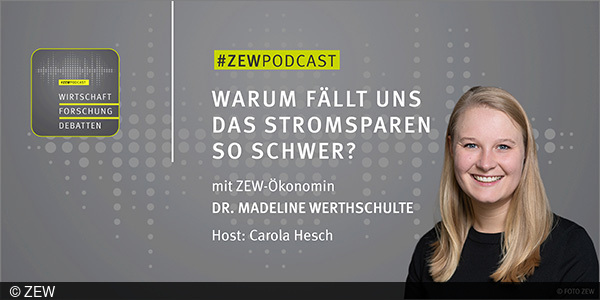#ZEWPodcast: Why Do We Find It So Hard to Save Electricity?
#ZEWPodcastZEW Economist Dr. Madeline Werthschulte on Energy Saving
The government is currently calling for people to reduce their consumption not only of gas, but also of electricity. This could indicate that the high prices are currently not incentive enough to get people to turn off the light when it is not needed and perhaps dim down the TV screen a little. Among researchers it’s been known for a while that electricity won’t necessarily be used less when the price goes up. In the latest #ZEWPodcast (in German language only), Dr. Madeline Werthschulte explains why this is the case and how it could possibly be changed.
“Electricity is difficult to understand as a good,” says Madeline Werthschulte, researcher for ZEW’s “Environmental and Climate Economics” Unit in the podcast episode. Difficult to understand, primarily because consumers actually don’t consume any electricity. “We consume so-called services enabled by electricity” – such as watching TV, doing the laundry, but also refrigerating groceries. And consumers only pay their electricity bill once a year, in contrast to other energy sources. “I’m expected to pay immediately to fill up my car, which creates a direct connection between paying and consuming,” states Werthschulte. In the case of electricity prices, the missing connection could be a problem if policymakers want to encourage people to use less electricity. The environmental economist tells podcast host Carola Hesch how her own study shows that people with a ‘present bias’ – those who pay for electricity immediately – consume twelve per cent less. The present bias, i.e. the tendency to accept a lower immediate benefit instead of waiting for a reward in the future, has already been proven in other experiments. One example is the well-known test with Kinder Surprise Eggs: The children are asked whether they would like to have a Kinder Surprise Egg immediately or two the next day. Most of the children decide to get one immediately.
On prepaid-electricity and commitment technologies
What can the government do to conserve electricity? According to Werthschulte, one possible solution is a prepaid model, as is already in use in the electricity sector in some cases: “With this model, you can only use electricity after you have topped up your electricity meter.” This has been common practice for credit cards and prepaid phone cards for a long time. Another possible approach are so-called commitment technologies. “A well-known commitment technology is to set yourself a goal – in this case a goal for electricity consumption,” says Werthschulte. In a field experiment, the ZEW researcher has already tested whether a set goal helps to consume less electricity. The consumers from a cooperating energy supplier were given access to an app with a goal-setting function, which the researcher and her team monitored. “By having the group send us regular scans of their meter, we were also able to get feedback,” Werthschulte says. According to the results of the experiment, there were no differences between the treatment group that used an app with a goal-setting function and the control group that did not use the app. However, the next experiment has already started. This time it’s about normative effects of subsidies – and water-saving shower heads.


